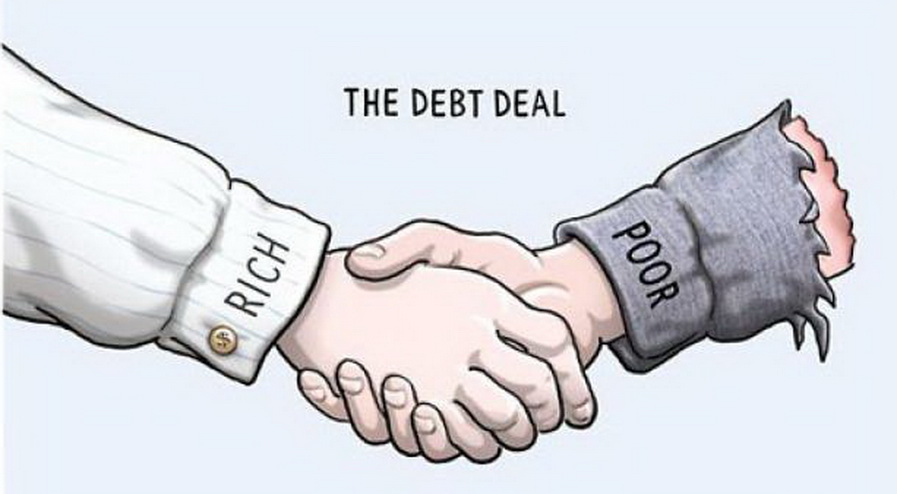Dating back to colonialism, the western powers have extracted resources from the poor. They have capitalized themselves by sucking the man power and deep pockets of the slave labours. However, the rich countries give more than $125bn (£102bn) in aid each year, to the poorer nation giving a solid evidence to their sheer goodwill of uplifting other countries. The story holds that the rich nations of the OECD give generously of their wealth to the poorer nations of the global south, to help them eradicate poverty and push them up the development ladder.
This story is so well propagated across borders by the industries and government of the richer countries that they easily block us from seeing the reality of things. As per reports from the Guardian, the US-based Global Financial Integrity (GFI) and the Centre for Applied Research at the Norwegian School of Economics recently published some contradictory data. As they summed up all of the financial resources that get transferred between rich countries and poor countries each year: not just aid, foreign investment and trade flows (as previous studies have done) but also non-financial transfers such as debt cancellation, unrequited transfers like workers’ remittances, and unrecorded capital flight; they concluded that the flow of money from the rich countries to the poor countries is of a much lesser degree compared to the flow that runs the other way round.
In 2012, the last year of recorded data, developing countries received a total of $1.3tn, including all aid, investment, and income from abroad. But that same year some $3.3tn flowed out of them. In other words, developing countries sent $2tn more to the rest of the world than they received. If we look at all years since 1980, these net outflows add up to a total of $16.3tn – that’s how much money has been drained out of the global south over the past few decades. To get a sense for the scale of this, $16.3tn is roughly the GDP of the United States.
This is a clear implication that the capital is flowing in reverse of what it should have been. The rich countries are made richer as they drain out the capital from the under-developed/developing countries. The rich countries are not really developing the poor ones, rather the poor ones are making them richer.
The grandeur outflow of money thrives firstly, on some of its payments on debt. Developing countries have given out over $4.2tn in interest payments alone since 1980 – a direct cash transfer to big banks in New York and London, on a scale that dwarfs the aid that they received during the same period. The second contributor is the income that foreigners make on their investments in developing countries and then repatriate back home. Think of all the profits that BP extracts from Nigeria’s oil reserves, for example, or that Anglo-American pulls out of South Africa’s gold mines. GFI calculates that developing countries have lost a total of $13.4tn through unrecorded capital flight since 1980.
Most of these unrecorded outflows take place through the international trade system – a practice known as “trade misinvoicing”. Basically, corporations – foreign and domestic alike – report false prices on their trade invoices in order to draw money out of developing countries directly into tax havens and secrecy jurisdictions. Usually the goal is to evade taxes, but sometimes this practice is used to launder money or circumvent capital controls. In 2012, developing countries lost $700bn through trade misinvoicing, which outstripped aid receipts that year by a factor of five. Multinational companies also steal scam from developing countries through “same-invoice faking”, shifting profits illegally between their own subsidiaries by mutually faking trade invoice prices on both sides. GFI doesn’t include same-invoice faking as it is tough to detect, but they estimate that it amounts to another $700bn per year. And these figures only cover theft through trade in goods. If we add theft through trade in services to the mix, it brings total net resource outflows to about $3tn per year. That’s 24 times more than the aid budget!
The large outflow of capital not only lowers the standard of living of the developing countries but also affect their economic graph keeping them in the loop of development forever. For every $1 of aid that developing countries receive, they lose $24 in net outflows.
A much improved statistical compilation and reporting is required in order to have a more adequate picture of global financial flows; a task that urgently needs to be undertaken collaboratively by the International Monetary Fund, World Bank, United Nations, Organization of Economic Cooperation and Development, and the Bank for International Settlements. The report also highlights the need for much greater transparency in domestic and global financial systems, particularly with regards to tax haven jurisdictions.
Fighting the illegal flow of capital needs an assistance of the tax havens which are also not as loyal as we expect them to be. There are more than 60 tax havens in the world, and the vast majority of them are controlled by a handful of western countries namely: London, Belgium, Manhattan. In short the coutries hosting the most number of tourists are the ones majorly responsible for the lump-sum theft from the poorer countries. The aid givers on the other hand, when taken into account considering this situation, might sound rather naïve. They trick people to believe that the givers instead of takers convincing the people that their hands are clean.
The solution to this giant problem is not unfeasible, freeing the developing countries off the load of debts would be the beginning. This will allow them to spend their cumulative money in the development of the country instead of paying the debts. We could also close down the secrecy jurisdictions, and slap penalties on bankers and accountants who facilitate illicit outflows; and we could impose a global minimum tax on corporate income to eliminate the incentive for corporations to secretly shift their money around the world.


















